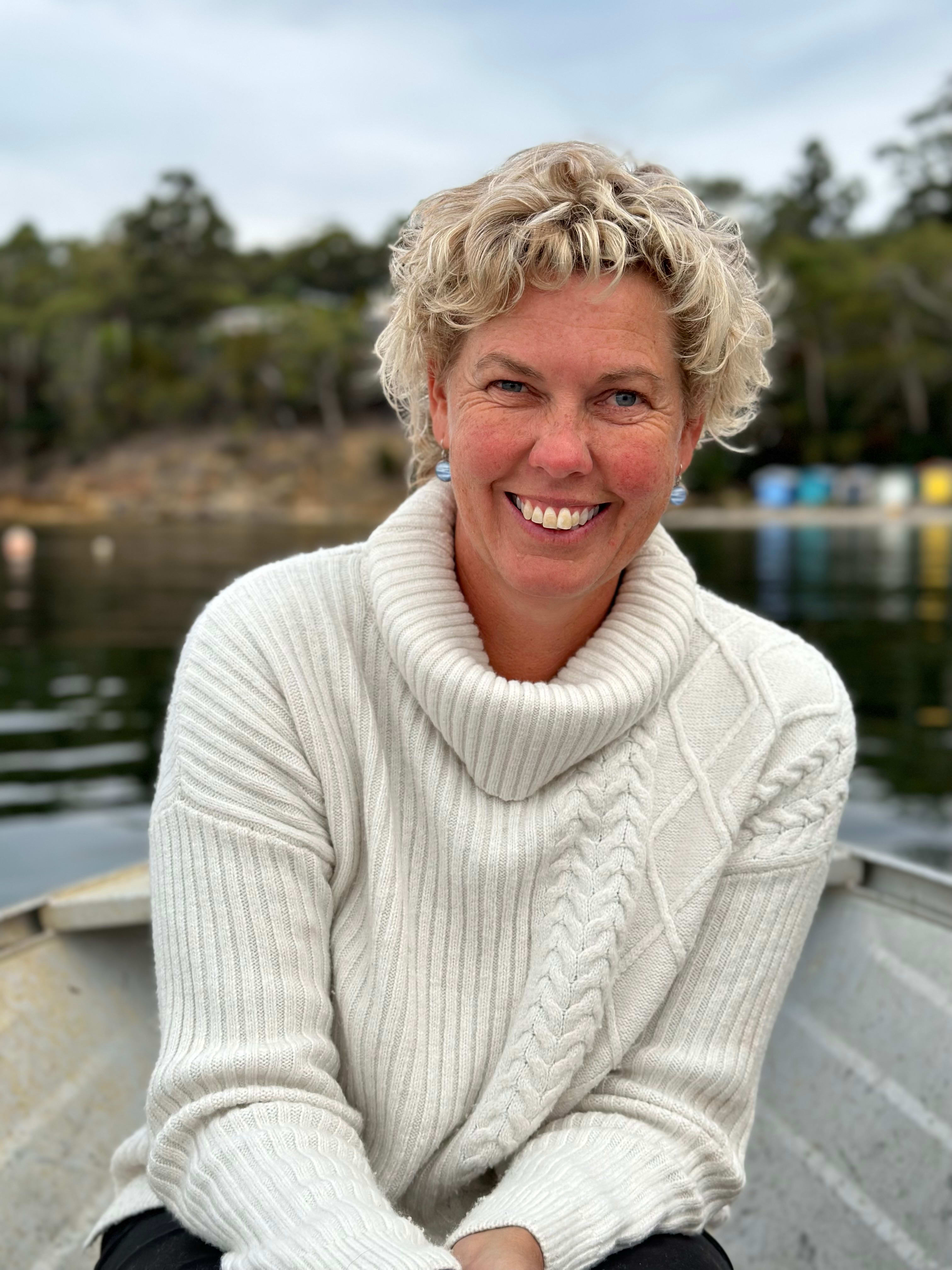In the wilds, time is just in the moment, in the beech leaves drifting down on the skin of a black river, in the fog hanging on the river’s surface, in the soothing sound of the river flowing. Time flows here. It does not click or beep or vibrate. It notifies us in a different way.
. . .
“There’s nothing sensible about sailing,” I thought as we threaded our way through Hells Gates by moonlight into the whitecap churn of the Southern Ocean. We slipped past Entrance Island lighthouse on the left and Macquarie Heads on the right, like a phantom ship, slinking out stealthily where no one else sane or legal would be at this time of night. The moon shone to light a world of choppy black and white water, and it felt good to be a pirate, a fugitive from normality.
It felt good to be alive.
As we pierced the notoriously narrow and shallow tidal cleft of the gates of Macquarie Harbour, we suddenly felt the surge of the ocean surround us. The boat began to sway and pitch. I felt the sea roll as we chopped through creamy caps, heading due west, before we were to set sail and turned left down the south-west coast of Tasmania. I was happy to be a long distance from the coast, as in the monochrome moonlight the jagged rocks of Cape Sorrel did not look at all friendly. Head west young man.
About midnight, with sails taut, we tacked south and the captain, Reg, gave me the wheel, saying, “Aim for those two stars in the south and you’ll be right.” With that, he went down to make supper and I steered the Taurus alone, following the stars like sailors have done since before time was even kept.
The boat rode up and down over the long swells. As the waves slopped against her, I felt keenly alert to every swing and sweep of wind. Not a little apprehensive, I remembered Reg’s words from earlier in the evening as we were sliding across the calm waters of Macquarie Harbour at twilight, “Just remember when we get out on the ocean, this boat floats.” I took his words for gospel – no matter how big the swell was and how insignificant the ocean made the boat feel, this boat would float.
Out of nowhere an albatross shot across the bow, a big white apparition flying in the middle of nowhere. And I thought, what a contrast, as I had begun the day listening to currawongs chortling in the rainforests of the Franklin River. Talk about contrasts.
Prelude: up the Franklin
We had headed out of Strahan on a day of brooding clouds, with shafts of silver sunlight piercing down dramatically from the grey. We sailed Reg’s boat across majestic Macquarie Harbour all day and then dropped sails to motor up into the narrows of the Gordon River in the late afternoon light, going as far as a 40-foot yacht could go. At dusk, as the river narrowed and the depth slipped below three metres, we moored between two Huon pines that hung over the river at either side of a small crescent along the shore. Low fog clung to the cold river’s skin, bathing us in purple light. Reg played a dreamy choral symphony by the Estonian Arvo Part that drifted in the darkness down the Gordon. Its Gregorian chants harmonised perfectly with the sullen wilderness. Spirituality is universal.
We fell asleep to the patter of a light rain draping over the boat.
That was last night. This morning, in a drizzle, we had climbed into Reg’s dinghy and motored up the Gordon before turning east to head up into the solace of the Franklin River. We rowed and motored, pulled and portaged all day, making it up to a steep rapid with a big boiling fall of river. This was as far as we could go with our dinghy, as far as we could intrude into the sanctity of this sacred river.
Huon and celery-top pines, mixed with beech trees and tall tree ferns cloaked the sides of the river, as they have done for thousands of years. A sea eagle soared above, checking out us frivolous interlopers. The dark river flowed timelessly through this ancient world of wilderness, perfectly at home with itself. The rest of the world is obsessed with time, with marking it, dividing it up into hours, minutes and nuclear seconds. But in the wilds, time is just in the moment, in the beech leaves drifting down on the skin of a black river, in the fog hanging on the river’s surface, in the soothing sound of the river flowing. Time flows here. It does not click or beep or vibrate. It notifies us in a different way.
We portaged the boat half a dozen times, pulling it with ropes and yanking it over rocks, walking through the freezing waters, slipping, sliding; we had explored an ancient cave, had a cup of tea below a limestone outcrop (drinking out of the dinghy’s baler as we’d forgotten the cups) while marvelling at marble cliffs. I felt we were just children, playing in this huge wilderness, children in an adult land of mystery and mysticism.
Heading back, we drifted down the river and I felt the presence of the other-worldliness of the Franklin, of the primordial – nothing but river, trees, rocks and rain. It struck me that here was a sublime wilderness of religious importance. Pure spirit enveloped us as I gave thanks to those who saved this “leech-ridden ditch” in little yellow rafts nearly 40 years ago.
If the rest of the planet should fall apart, at least the Franklin River country would still be there to preserve the world as it was created and still flourishes today; a world unto itself – dark and reclusive; a secret and sane world.
And what a contrast to the ocean world that we were sailing through tonight. The ocean is the last great wilderness and is under-rated by us tree huggers. It is a wilderness where you enter at your own risk and understand or perish. It is a wilderness where you learn from its wildness and from its disinterest in humans.
The sails creaked and cracked as the boat began to yaw; I quickly straightened her and all was right again as we resumed our gas lighting across the sea. From drifting down the Franklin River to skimming across the Southern Ocean under a porcelain moon, all in the same day – how lucky was I?
Around Port Davey into Bathurst
I awoke on the damp deck at dawn from a fitful sleep as we neared the outcrops and headlands of Port Davey. The day was pewter grey and the headlands and distant mountains were dark and imposing. There were no other boats – just our little cork on the edge of this remote Tasmanian coastline.
We rock and rolled as close as we could to the waves crashing against Breaksea Island before sailing through the neck of Bathurst Channel and into the calm gloss of Bathurst Harbour.
As I looked at Reg and John, I figured we had 201 years of life experience between the three of us. John was an old sea dog who had been sailing for most of his 75 years and he knew the south-west wilderness well, having been here in the 1970s with Tasmanian wilderness legend Deny King when they were searching for tin. They never found tin, but they learned a lot about living off the land and being practical in the bush or on the water.
This was the real world, sublime and vast (Bathurst Harbour is three times bigger than Sydney Harbour) and the distant mountains, shrouded in clouds climbing up from buttongrass plains, contrasted with the dark river and rainforests of yesterday. Was it only yesterday? It seemed like a long-past dream.
As I steered the boat I breathed in the fresh air and scanned the mountain views and secret inlets, just as the 18th century French sailors would have: alert and curious; and I felt I saw them just as the Aboriginal tribes who were here millennia ago must have seen them. We were time travellers, ghosts, just passing through.
It might have been madness to sail all night to get here, but the morning light was worth it as it played silver and bronze stanzas across the honey-coloured moorlands and I felt it was a privilege to be here, bathed in the poetry of the Tasmanian wilderness.
We explored the Bathurst’s inlets and bays and moored at Clayton’s Corner, just across from Melaleuca, where a jetty awaited our lines and I was able to go for a hike to get a taste of the landscape.
As fog began to close in with the evening, I returned to the warm glow of the red and green lights of the boat. From an allegro of rolling seas to now a quiet sonata of drizzle slowly seeping across buttongrass plains, it was another day of musical contracts. A wallaby stirred in the bush.
However there was no music in the boat as we ate dinner and listened to the static staccato of a maritime forecast – gale force winds and wild seas were predicted in a few days, when we planned to be back at sea, and just as I thought we would have a quiet night in this quiet bay with quiet rain falling over the boat, Reg and John decided it was time to go, that we should motor another couple of hours, that night, back up the harbour so we could get out early in the morning and beat the weather.
This is your captain speaking.
South by south-east
For the next two days we made haste slowly but swiftly, with friendly but fickle winds, slopping waves and long, deep-rolling swells, the horizon disappearing behind valleys of water; around South West Cape, past Maatsuyker Island and on to Recherche Bay and up the channel past Bruny Island.
No songs played as we entered Kettering; the final movement was just the wonderful silence of Tasmania, of a boat skating into a peaceful bay without fanfare, of the wilderness of the sea left behind us. (The next day there were storm force winds, huge seas and snow at Woodbridge – we had beaten the wild weather just in time.)
We had sailed across remote waters of remote harbours at the bottom corner of an island far away from anywhere on earth and there had been nothing sensible or sane about this, but as I stepped on the dock I felt the sanest man alive.
Where to next, captain?
Don Defenderfer is a native of San Francisco who once went on a holiday to Alaska where he met an Australian who told him to visit Tasmania. So he did, and while here he met a woman. That was 30 years ago. He was state coordinator for Landcare for many years, a job that allowed him to be inspired by not only the beauty of the Tasmanian landscape but by the many people that are trying to repair and renew it. He has a Masters Degree in Social Ecology and a Bachelor of Environmental Studies with a minor in writing. He has published three volumes of poetry, and his work has appeared in newspapers and periodicals, including The New York Times and The Australian.
















